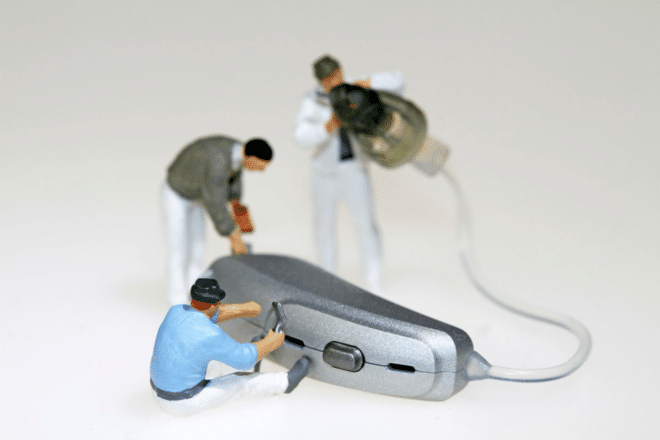In our Audiology practice, we see firsthand how hearing care helps make people happier, more active, and more connected to friends and family. It’s why we do what we do!
And now, a growing body of recent research indicates a strong link between hearing loss and a host of other chronic health conditions including dementia, anxiety and depression, and risk of falling. In most of these situations, aging leads to hearing loss, which leads to trouble understanding speech, which leads to greater isolation. This in turn leads to impaired cognition, poorer quality of life and poorer physical functioning.
Hearing Loss and Aging
Doctors widely accept the notion that hearing loss is an inevitable part of aging. As many as two-thirds of active seniors in their 70s have some degree of hearing loss. Age-related hearing loss generally starts slowly. Adults in their 40s and 50s often dismiss the early signs, especially when family members help offset their hearing loss symptoms by repeating themselves or explaining something they missed.
Data shows that on average, it takes 7 to 10 years from the time someone notices they have a hearing problem until they seek treatment. Perhaps they saw their parents’ experience with older hearing aid technology and assume hearing aids won’t work for them. Maybe vanity says wearing hearing aids somehow makes one look older or weaker. Cost is sometimes perceived as an obstacle. This delay often continues until hearing loss can no longer be ignored.
If you think you can’t hear, the reality is you probably have some hearing loss, and it’s been going on for years.
If you think you can’t hear, the reality is you probably have some hearing loss, and it’s been going on for years. The stakes may be higher than just being able to hear fully. If you could slow the progression of cognitive decline due to hearing loss, would it be worth the effort? We think so.
It Starts With Misunderstanding Speech
Hearing loss is frequently misunderstood as strictly a volume problem. While volume levels do tend to suffer at higher frequencies in age-related hearing loss, the bigger issue is comprehension of words. When volume levels become a problem, it makes it more difficult to distinguish sounds, especially consonants and sibilant sounds such as words with a ‘sh’ sound.
Our brains are amazing. Someone with normal hearing can fill in gaps in hearing based on correctly capturing some words and adding context. For example, if it’s 9 am on a Sunday morning, and your spouse asks what you would like for ________, you can probably guess the answer should be “French toast,” even if you didn’t really understand the word “breakfast.” But if you take away more sounds, lip-reading, and context, filling in that missing word becomes much harder.
The good news is, more than 90% of age-related hearing loss is treatable with properly selected, fitted, and programmed digital hearing aids. If treated early, volume loss can be addressed with smaller, more discreet hearing aids, and the time to restore comprehension is reduced.
More than 90% of age-related hearing loss is treatable with properly selected, fitted, and programmed digital hearing aids.
Untreated Hearing Loss Leads to Isolation
If hearing loss isn’t treated, it tends to lead to further isolation. Because understanding speech is even more difficult out in the world, people with untreated hearing loss often begin to avoid situations where it can be hard to pick out voices from the clutter: places like restaurants, stores, and gatherings. This can lead to anxiety and frustration as people anticipate awkward moments or social snafus. For example, imagine trying to decipher that breakfast scenario with more noise in the background–it would be almost impossible.
Have you noticed people with untreated hearing loss often seem fatigued or annoyed after situations that require them to interact with others? It’s because for them, listening is a stressful activity. They are actively trying to tune into conversations, working hard to guess the words they are missing. They often feel embarrassment about asking people to repeat their words and become frustrated when they miss key parts of conversations.
Isolation Leads to Decline
This cognitive overload from trying to understand garbled messages forces their brains to work harder to hear. And studies show that drawing more brain resources away to hear may affect other areas such as short-term memory. This only makes social interactions harder and more stressful.
As a result, people with untreated hearing loss often reduce their social engagements, which leads to loneliness and depression. Daily interaction is essential to happiness and feelings of self-worth. According to the Centers for Disease Control and Prevention (CDC), recent studies have shown that isolation can have serious consequences:
- Social isolation significantly increased a person’s risk of premature death from all causes
- Social isolation was associated with about a 50% percent increased risk of dementia
- Poor social relationships (characterized by social isolation or loneliness) were associated with a 29% increased risk of heart disease and a 32% increased risk of stroke
- Loneliness was associated with higher rates of depression, anxiety, and suicide
- Loneliness among heart failure patients was associated with a nearly 4 times increased risk of death, 68% increased risk of hospitalization, and 57% increased risk of emergency department visits
A Worsening Decline
Once social withdrawal starts, isolation tends to lead to more isolation. Family members can feel shut out when their loved ones withdraw, making it more difficult to help. This separation can also make it harder for family and friends to notice signs of physical decline, meaning the person might not get treatment for other physical conditions or mobility issues. British researchers recently reported that seniors who lived alone or had few social contacts were more than 24% more likely to have falls than their peers with social connections.
As a person spends more and more time alone, the pathways in the brain that used to recognize voices become untrained, and hearing comprehension continues to decline. Studies have shown that untreated hearing loss contributes to worsening cognition: people with untreated hearing loss are 24% more likely to experience cognitive decline within 6 years compared to folks with normal hearing. In this vicious cycle, any treatment becomes more and more difficult.
Hearing Loss and Dementia
Researchers say that, compared to those with normal hearing, seniors with moderate hearing loss have triple the risk of developing dementia. Exactly why the risk increases so dramatically is still unknown. Researchers believe that a form of brain atrophy sets in as hearing paths are under-exercised.
Even when people are enjoying life with full hearing, there are many other factors, such as high blood pressure and diabetes, contributing to dementia in seniors. Researchers are now exploring if earlier hearing care and its cognitive benefits may slow the onset of dementia.
Intervening with Hearing Care
Here at our clinic, we firmly believe that treating hearing loss as soon as possible increases quality of life. If hearing treatment is proven to stall the onset of dementia, that would be welcome news. Another recent hearing loss research study agrees with the issues we’ve discussed surrounding cognition, social isolation, and the risk for dementia. Then, it makes a bold suggestion: “Interventions delaying the onset of dementia by even one year would decrease the worldwide prevalence of dementia by 10%.” That sounds pretty good to us.
If you’re concerned about hearing loss, make an appointment with us and we’d be happy to assess your hearing and make any product recommendations if necessary.



